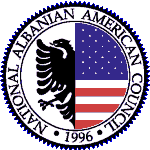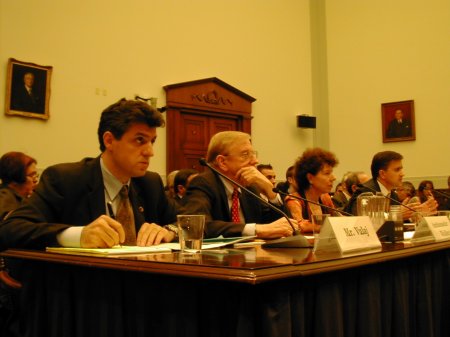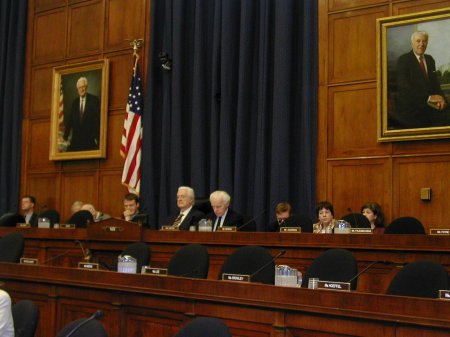NAAC Testifies in the US Congress on the Future of Kosova
 National Albanian American Council
National Albanian American Council2021 L Street, N.W., Suite 402, Washington, DC 20036 481 8th Avenue, Suite 922, New York, NY 10001 Brigada e Krajishtes, No. 8, 38000 Prishtina, Kosova Telephone: (202) 466-6900 Fax: (202) 466-5593 Web: www.naac.org Email: [email protected] --- For Immediate Release: May 22, 2003 Contact: Valbona Sherifi (202) 466-6900
The National Albanian American Council (NAAC) testified before the United States Congress at a Hearing of the House International Relations Committee on the Future of Kosova, which was held on May 21, 2003.
 Ambassador William Walker, Honorary Board Member of NAAC and Former Director of the OSCE Kosova Verification Mission and NAAC Executive Director Martin Vulaj both represented NAAC's position on the independence of Kosova. Former Congressman Joe DioGuardi and his wife Shirley Cloyes DioGuardi represented the Albanian American Civil League (AACL). Other distinguished witnesses in this hearing were Deputy Assistant Secretary for South Central Europe, Janet Bogue of the US State Department; Mr. Jim O'Brian, Former Special Presidential Envoy for the Balkans and Senior Advisor to Secretary Albright; and Daniel Serwer, Director of the Balkan Initiative at the United States Institute of Peace.
 Members of the Committee on International Relations that attended this hearing were Congressman Henry Hyde, Chairman; Congressmen Tom Lantos; Eliot Engel, Chairman of the Albanian Issues Caucus; Christopher Smith; Dan Burton; Dana Rohrabacher, Nick Smith, Jo Ann Davis; and Congresswoman Betty McCollum. The Chairman of the International Relations Committee, Honorable Henry Hyde opened the hearing by providing to the audience a brief description of the situation in Kosova today. The United Nations resolution 1244 of June 1999, that created the United Nations Mission in Kosova (UNMIK), left the final status of Kosova unresolved. As of today, Kosova remains a UN protectorate with about 25,000 troops maintaining peace in the region. The level of unemployment has skyrocketed to 60 percent and there are worries that if something is not done to employ the people of Kosova (over 50 percent of which are under the age of 25) they might turn toward organized crime and resort to violent actions as means to provide for their living. According to Congressman Tom Lantos, long-term stability in Kosova and the region would require more than reconstruction it needs a resolution of finals status - independence. Congressman Lantos together with Congressman Hyde has co-sponsored House Resolution 28, which states that the U.S. should declare its support for the independence of Kosova. In 1968 Kosova gained representation at the Federal level in the Yugoslav Republic. However, the international community did not recognize its right to self-determination (even though it recognized countries such as Slovenia, and Bosnia-Herzegovina). Kosova deserves independence for the same reasons as other former constituents of Yugoslavia: security, democracy, and justice. Congressman Eliot Engel, a strong supporter of the Albanian cause, concurred in his statement with the proposal that independence should be the solution for the final status of Kosova. Neither continuing long-term international presence, nor making Kosova the third republic alongside Serbia and Montenegro, would solve the conflict in the region. In addition, he advocated that the United States should play an active role to make sure that independence is achieved for all of Kosova, including the region of Mitrovica. Congressman Engel advocated a gradual process toward independence that would take from one to two years, as outlined during the November 2002 meeting co-sponsored by NAAAC, the Center for Strategic and International Studies (CSIS) and the Dayton Peace Accords Project (DPAP). Congressman Dana Rohrabacher was also in support of the independence of Kosova. He stressed the administration's concern for the European audience and consideration for the aggressors over the victims. The U.S. has based its policies thus far on political benchmarks, rather than on moral and ethical concerns. Congressman Smith of New Jersey raised the issue of the Roma Serbs and other minorities within Kosova and how such groups have not been allowed to return to their homes in the region. In addition, he brought up attacks on the Orthodox churches from the part of the Kosovars. Based on these examples, he argued that Kosova is not yet ready to be an independent entity because it cannot keep such violence/incidents in check, and therefore, it should remain a UN protectorate. Bogue, Deputy Assistant Secretary for South-Central Europe, stated the current position of the US Administration on the future status of Kosova. According to her, Kosova has made real progress in governance, law and order, ethnic relations, security, and the economy. It has gone through three successful elections, including Kosova-wide elections in November of 2001, and now has a government and developing democratic institutions. In addition, Kosova's police force is assuming most police functions and is approaching its capacity of 6,500 personnel. Bogue also argued that there has been less progress in creating an integrated judiciary and closing the Belgrade-supported courts that continue to exist in Serbian municipalities. Another challenge is organized crime, a problem that can be tackled through measures such as increased witness security. Ethnic problems are improving slowly but unevenly - the most important development remains the participation of Kosova Serbs and other minorities in elections, which has resulted in significant Serbian representation in the Kosovar Assembly. Tensions continue in many areas, however, and while the number of incidents is down, the violence continues. Freedom of movement is also problematic. Kosova's economy has also been an issue of close observation by the U.S. government. Kosova's access to lending is also problematic; international financial institutions, such as the IMF and the World Bank, are unable to extend credit to Kosova because neither the UN administration, nor Kosovar institutions are able to provide a sovereign guarantee. Therefore, Bogue added, the US supports the 'standards before status' approach of the UN Secretary General's Representative in Kosova, Michael Steiner. She did not offer a concrete timeframe, or even an estimate, of how long it might take for Kosova to achieve these benchmarks. The US administration opposes both immediate independence and immediate partition. The administration opposes Resolution 28 because such resolution could lead to confusion about the position of the US and could detract from the work of institution-building and ethnic reconciliation. Mr. and Mrs. DioGuardi testified in this hearing on behalf of the Albanian American Civic League. According to them, there is no peace and stability without Kosova's independence. Albanians are best friends of the United States and deserve what they want - freedom and independence. NAAC Executive Director Martin Vulaj stated that the lack of final status has been a principle source of instability in Kosova. It fosters fear and distrust on the part of Albanians and false hope on the part of Serbs. It discourages foreign investment and provides oxygen to the simmering ambers of Nationalism. To put many of these issues to rest Kosova must move on to final status. NAAC Council resolutely believes that the only option that will enable Kosova to capitalize on its' progress, face its' challenges, overcome it's obstacles and not only enjoy stability but be a factor of regional stability is to become an independent state that will be integrated into Europe and Euro-Atlantic structures. While an independent Kosova will present challenges, any other option will surely result in continued internal and regional instability. An independent Kosova would be a factor of stability. Such a result would put to rest much of the Nationalism that exists in the region. Kosova would have a stabilizing effect on Albanian issues in the surrounding areas and would be a key partner in any discussions involving issues in the region. Additionally, Kosova, with its complete and unwavering support for the United States would be a key regional ally in the war against terrorism. The United States must take the lead on resolving the final status of Kosova. The U.S. has a strategic interest in Balkan security as well as in maintaining regional influence as the Balkans move ever closer to Brussels' orbit. At the end of his testimony, Vulaj submitted to the record of this hearing a final report, which was a result of the international conference, held last November at CSIS and was sponsored from NAAC, CSIS and DPAP. Ambassador William Walker shared in his testimony his experience as Director of the OSCE Kosova Verification Mission. Among other things, Ambassador Walker suggested four possible paths, strategies that might be pursued to move Kosova towards final status. According to him out of all the paths only independence can offer the possibility of a Balkans moving away from the tragic, ethnic, religious, linguistic legacies of the past. Ambassador Walker emphasized that he is "a firm advocate of full independence, now or soon as humanly possible to obtain." This hearing was a positive step forward in that it brought attention to the issue of Kosova once again in the US Congress at a time when almost everyone else is concerned with issues in other regions of the world. NAAC is a not-for-profit organization dedicated to advocating for Albanians and promoting peace and economic development in the Balkans by fostering democratic policy, promoting respect for human rights, and conducting educational and developmental programs. For more information on the National Albanian American Council please visit us on the web at www.naac.org
-- sent by A. Alimehmeti
|

